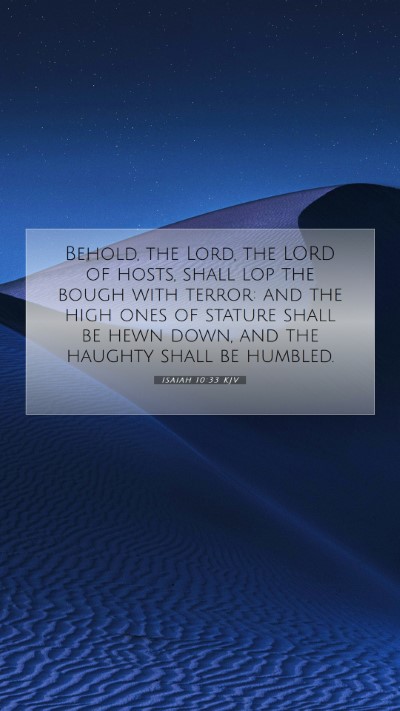Isaiah 10:33 states:
"Behold, the Lord, the Lord of hosts, shall lop the boughs with terror: and the high ones of stature shall be hewn down, and the haughty shall be humbled."
This verse carries significant weight in understanding God's judgment and the humbling of the proud. Here, we will explore the meaning of this Bible verse through various interpretations and commentaries.
Bible Verse Meaning
Isaiah 10:33 presents a vivid image of God's power in executing judgment on the proud and the mighty. In this analysis, we draw from the insights of public domain commentaries, including those of Matthew Henry, Albert Barnes, and Adam Clarke.
Overview of Key Themes
- God's Sovereignty: This verse emphasizes God's control over nations and their leaders.
- The Fall of the Proud: It depicts how God actively brings low those who exalt themselves.
- Judgment through Destruction: The image of lopping branches symbolizes a thorough cleaning and judgment of what is high and proud.
Matthew Henry's Commentaries
Henry interprets this verse as a warning against the arrogant. He notes that the "Lord of hosts" signifies God's supreme authority and the military might of heaven. The action of "loping the boughs" illustrates the decisive and severe nature of divine judgment.
Henry further explicates that the "high ones of stature" being hewn down indicates not only the leaders of Israel but also those who are perceived as invincible. This reflects a reversal of fortune where the humble are exalted and the proud are brought low.
Albert Barnes' Perspectives
Barnes also reinforces the notion of God's sovereignty in this verse. He suggests that the "boughs" symbolize the pride and power of individuals or nations that are destined for destruction. The image portrays a future where God will act decisively to remove the oppressive powers that stand against His will.
Moreover, he emphasizes that this is not merely a physical fall, but also a spiritual one. God dismantles the structures of pride that lead people away from Him, signifying a call for humility and reliance on divine strength.
Adam Clarke's Exegesis
Clarke delves into the metaphorical language of the text. He interprets the "loping" as indicative of purging and cleansing—removing what is out of place or harmful. The "terror" is not just an emotion but a tool used by God to assert His authority and instill fear in the hearts of the proud.
Clarke concludes by urging readers to recognize the importance of humility before the Lord, as those who stand tall in arrogance risk facing His judgment. This serves as a sobering reminder of the transient nature of human power.
Cross References
For a deeper understanding, consider these related scripture passages:
- James 4:6: "But he gives more grace. Therefore, it says, 'God opposes the proud but gives grace to the humble.'
- Psalms 37:34: "Wait for the Lord and keep his way, and he will exalt you to inherit the land; you will look on when the wicked are cut off."
- Luke 1:52: "He has brought down the mighty from their thrones and exalted those of humble estate."
Applying Bible Verse Insights
Incorporating the insights from Isaiah 10:33 into daily life invites reflection on personal pride and the reliance on God. Here are some applications:
- Consider areas in life where pride may be evident and seek God's help in cultivating humility.
- Recognize that true strength comes from submission to God rather than self-reliance.
- Engage in community discussions about how to support one another in maintaining a humble spirit.
Conclusion
Isaiah 10:33 serves as a powerful reminder of God's dominion over all and His intent to humble the proud. Through the insights of respected commentators, we gain a richer understanding of the Bible verse meaning, which augments our knowledge in Bible verse interpretations and understanding Scripture.
This exploration encourages an ongoing dialogue within Bible study groups and promotes further engagement through online Bible study, utilizing the aforementioned Bible study resources and study tools.


